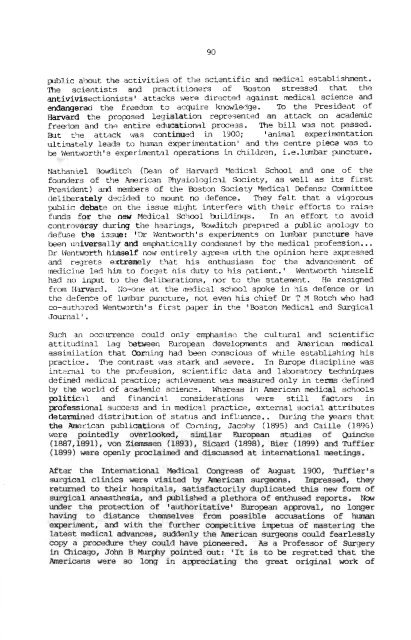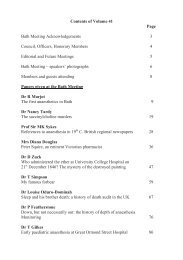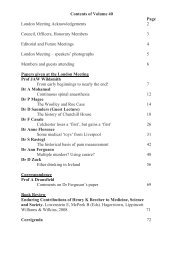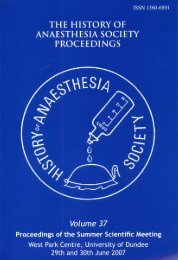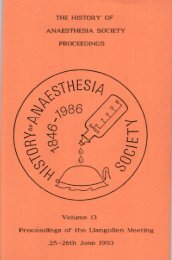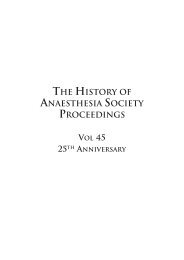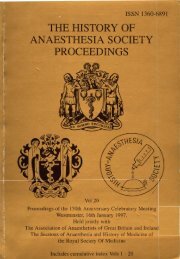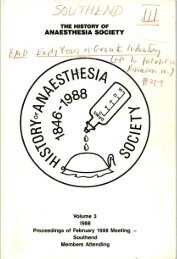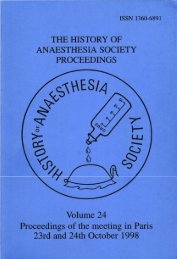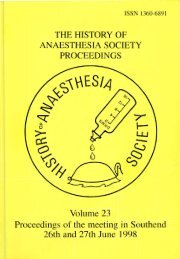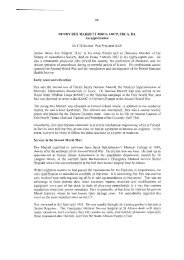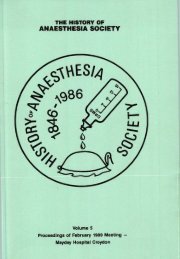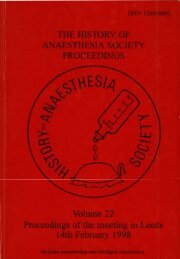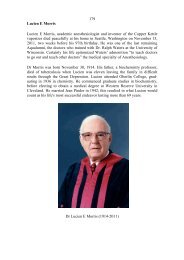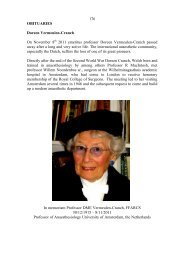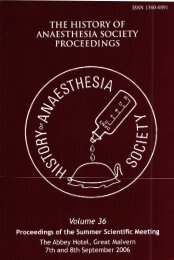Volume 9b - History of Anaesthesia Society
Volume 9b - History of Anaesthesia Society
Volume 9b - History of Anaesthesia Society
Create successful ePaper yourself
Turn your PDF publications into a flip-book with our unique Google optimized e-Paper software.
plblic atmut the activities <strong>of</strong> tj~e scientific and medical establishment.<br />
me scientists and practitioners <strong>of</strong> Boston stress& that the<br />
antivivisectionistsl attacks were directed against medical science and<br />
endangered the fre~com to acquire knawledge. 'lb the President <strong>of</strong><br />
Harvard the propsed legislation repreqented an attack on academic<br />
fredom and the? entire el~cational process. The bill ms not passed.<br />
IUt t9e attack rms continued in 1900; 'animl experimentation<br />
ultimately leads to h m exprimeritation' and the centre piece was to<br />
be \ientrrrorthts experimental operations in children, i.e.lumbar pmcture.<br />
Nathaniel Boditch (Desn <strong>of</strong> Harvard Yeclical School and one <strong>of</strong> the<br />
founders <strong>of</strong> the Anlerican PAy~iologic-11 <strong>Society</strong>, as well as its first<br />
President) and members <strong>of</strong> the Boston <strong>Society</strong> Yedica'L Defensr Cornittee<br />
deliberately decided to mount no defence. They felt that a vir~orous<br />
public debate on the issue might interfere with thsir efforts to raise<br />
funds for the new Medical Sc~ml hildinys. In an effort to avoid<br />
controversy during the hearings, Rotditch prepxed a public avlogy to<br />
defuse the issue: 'Dr Wentworth's expriments on lumbar puncture have<br />
ken universally and emphatically condemned by the medical pr<strong>of</strong>ession ...<br />
Dr Plentworth himself now entirely &Fees with the opinion here axpressed<br />
and regrets extrmly that his enthusiasm for the advancement <strong>of</strong><br />
rnedicir~e led him to forget his duty to his ptient.' Wentworth I.limself<br />
had no input to the deliberations, nor to the statement. He resigned<br />
from Itwvard. No-one at the medical sc'.iool spoke in his defence or in<br />
the defence <strong>of</strong> lumbx puncture, not even his chief Dr T ?iI Rotch who had<br />
m-authored Wentworthls first paper in the 'Boston Medical and Surgical<br />
Journal ' .<br />
Such an occlrrence could only emphasise the cultural and scientific<br />
attitudinal lag txtween &rowan developments and Awrican medical<br />
assimi.lation that Corning had been conscious <strong>of</strong> while establishing his<br />
practice. The contrast rvas stark and severe. In Europe discipline was<br />
internal to the pr<strong>of</strong>ession, scientific data and 13bratory tt~hniques<br />
defined medical practice; achievement was rneasured only in terms defi.ned<br />
by the world <strong>of</strong> academic science. Whereas in American medical schcwls<br />
political and financial consiclerations were still factors in<br />
pr<strong>of</strong>essional success and in medical practice, external social attributes<br />
determined distritmtion <strong>of</strong> status and influence.. During the years that<br />
the American publications <strong>of</strong> Coming, Jacoby (1895) and Caille (18915)<br />
were pointedly overlooked, similar European studies <strong>of</strong> Quincke<br />
(1887,1891), von Ziemssen (1893), Sicard (1898), Bier (1899) and Tuffier<br />
(1899) were openly proclaimed and discussed at internation31 meetings.<br />
After the International Medical Congress <strong>of</strong> August 19K1, 'ILlffierls<br />
surgical clinics were visited by Mrican surgeons. Impressed, they<br />
returned to their hospitals, satisfactorily duplicated this new form <strong>of</strong><br />
surgical anaesthesia, and plblished a plethora <strong>of</strong> enthused reports. Now<br />
under the protection <strong>of</strong> 'authoritative1 European approval, no longer<br />
having to distance themselves from possible accusations <strong>of</strong> h m<br />
experiment, ancl with the further competitive impetus <strong>of</strong> mastering the<br />
latest medical advances, suddenly t!le American surrJeons could fearlessly<br />
copy a procedure they could have pioneered. As a Pr<strong>of</strong>essor <strong>of</strong> Surgery<br />
in Chicaqo, John R Mtqhy pointed out: 'It is to be regretted that the<br />
Americans were so long in awreciating the great original work <strong>of</strong>


